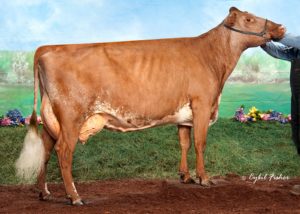Farm Succession Planning in Vermont Shines Light for a New Generation of Farmers
July 11, 2017/
This article was featured in the Summer 2017 Quarterly.
By Rachel Carter
“I want to die with my boots on,” a New England farmer stated in a focus group held by the American Farmland Trust and Land For Good, to study U.S. Census of Agriculture data on retiring farmers and future plans for the farms.

Green Acres Milking Shorthorns cows were sold as a part of a successful farm transfer in Randolph, Vermont. Credit Green Acres Milking Shorthorns.
According to the study in April 2016, nearly 30% of New England’s farmers will most likely retire during the next decade, and only one in 10 are farming with someone age 45 or younger by their side. This paints a grim picture surrounding the future of farming and accessibility of farmland to the next generation of farmers for food production in New England.
“Some senior farmers may have a plan for their farm’s future,” said Jesse Robertson-DuBois, New England Director for American Farmland Trust. “But we learned through this study that many do not. A large number of older farmers are worried about their ability to retire and to find a younger farmer who can afford to buy their land.”
At no point is a farm’s future more at risk than during ownership transition. Farmers involved in the study expressed they need help to make sound transfer agreements.
“The 1.4 million acres they [farmers] manage and $6.45 billion in land and agricultural infrastructure they own will change hands in one way or another,” said Cris Coffin, Policy Director for Land For Good, who directed the study. “To keep this land and infrastructure in farming as it transitions, we will need better policy tools and increased support services to exiting and entering farmers.”
Read the rest of the article here.
Posted in News and Updates

